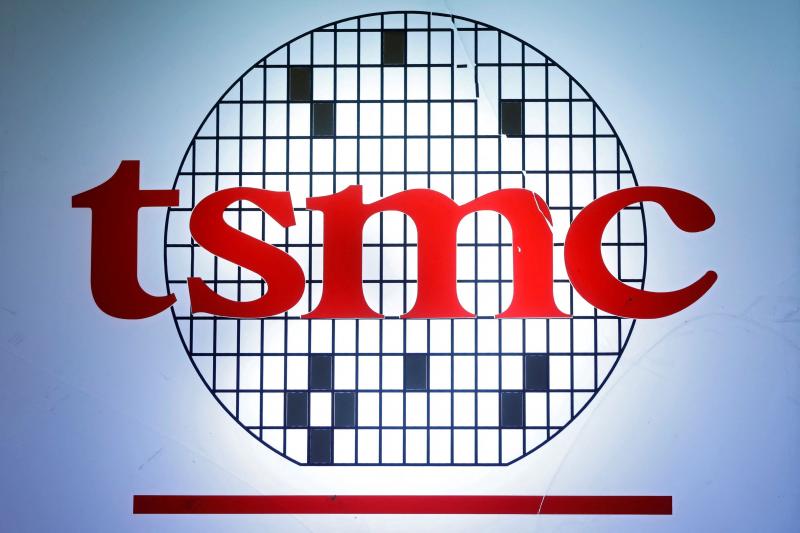Taiwan Semiconductor Manufacturing Co (TSMC, 台積電) plans to begin production with its A14 fabrication process in 2028, aiming to remain at the cutting edge of the chip industry.
The technology would advance the world’s biggest chipmaker beyond its current state-of-the-art 3-nanometer technology and the upcoming 2-nanometer process later this year. In a change of nomenclature, TSMC also plans an intermediary A16 chip process for late next year.
Taiwan’s most valuable company has kept up a steady pace of upgrades that has seen it corral Apple Inc and Nvidia Corp’s most lucrative chipmaking business.

Photo: REUTERS
The company plans about US$40 billion in capital expenditures this year, and its top executives have said its long-term plans are still geared to capture strong artificial intelligence (AI)-driven demand.
At a company event in California on Wednesday, executives laid out the new addition to TSMC’s road map, and detailed how it would help improve power efficiency and performance.
Deputy cochief operating officer Kevin Zhang (張曉強) said he sees an industry shift afoot: Where smartphone component makers used to be the first adopters of new production technology, the boom in AI has made designers of larger AI chips more willing to jump to the latest innovation sooner.
TSMC remains confident that overall demand for semiconductors would continue to rise and total industry revenue would “easily” exceed US$1 trillion by the end of the decade, Zhang said.
While that is a sales target the chip industry has largely embraced, investor anxiety about an AI bubble has grown in the past few weeks with the announcement of wide-ranging tariffs by the US.
A significant advancement from TSMC’s industry-leading 2-nanometer process technology, the A14 logic process technology is designed to drive AI transformation “by delivering faster computing and greater power efficiency,” the company said in a statement.
That is one of a slew of advanced technologies at its annual North America Technology Symposium in California, with a focus on its next-generation AI chips.
TSMC chairman C.C. Wei (魏哲家) hosted the opening ceremony in Santa Clara for the company’s flagship customer event of the year, which drew registrations from more than 2,500 attendees.
Additional reporting by CNA

The combined effect of the monsoon, the outer rim of Typhoon Fengshen and a low-pressure system is expected to bring significant rainfall this week to various parts of the nation, the Central Weather Administration (CWA) said. The heaviest rain is expected to occur today and tomorrow, with torrential rain expected in Keelung’s north coast, Yilan and the mountainous regions of Taipei and New Taipei City, the CWA said. Rivers could rise rapidly, and residents should stay away from riverbanks and avoid going to the mountains or engaging in water activities, it said. Scattered showers are expected today in central and

COOPERATION: Taiwan is aligning closely with US strategic objectives on various matters, including China’s rare earths restrictions, the Ministry of Foreign Affairs said Taiwan could deal with China’s tightened export controls on rare earth metals by turning to “urban mining,” a researcher said yesterday. Rare earth metals, which are used in semiconductors and other electronic components, could be recovered from industrial or electronic waste to reduce reliance on imports, National Cheng Kung University Department of Resources Engineering professor Lee Cheng-han (李政翰) said. Despite their name, rare earth elements are not actually rare — their abundance in the Earth’s crust is relatively high, but they are dispersed, making extraction and refining energy-intensive and environmentally damaging, he said, adding that many countries have opted to

SUPPLY CHAIN: Taiwan’s advantages in the drone industry include rapid production capacity that is independent of Chinese-made parts, the economic ministry said The Executive Yuan yesterday approved plans to invest NT$44.2 billion (US$1.44 billion) into domestic production of uncrewed aerial vehicles over the next six years, bringing Taiwan’s output value to more than NT$40 billion by 2030 and making the nation Asia’s democratic hub for the drone supply chain. The proposed budget has NT$33.8 billion in new allocations and NT$10.43 billion in existing funds, the Ministry of Economic Affairs said. Under the new development program, the public sector would purchase nearly 100,000 drones, of which 50,898 would be for civil and government use, while 48,750 would be for national defense, it said. The Ministry of

African swine fever was confirmed at a pig farm in Taichung, the Ministry of Agriculture said today, prompting a five-day nationwide ban on transporting and slaughtering pigs, and marking the loss of Taiwan’s status as the only Asian nation free of all three major swine diseases. The ministry held a news conference today confirming that the virus was detected at a farm in Wuci District (梧棲) yesterday evening. Authorities preemptively culled 195 pigs at the farm at about 3am and disinfected the entire site to prevent the disease from spreading, the ministry said. Authorities also set up a 3km-radius control zone